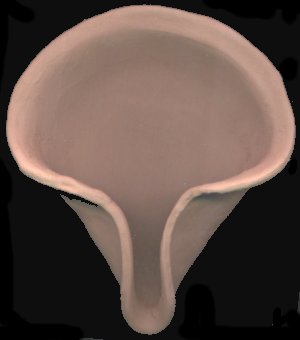 |
CANAAN:
Circa 1500 B.C to 600 B.C. Among the earliest of clay lamps is the saucer lamp of the Iron Age.
In antiquity, these develped after a saucer had it's edges folded up to
form a spout. A great variety of these lamps exists, and this replica is
based on a style common from about 1200 BC to 800 BC, but could extend
farther back and forward in time several centuries. These lamps would have
been the style in use in the Old Testament. Every Canaan lamp is
hand folded, so variation from that seen in the photo willoccur, but all
have this general look. (about 4.75 inches in diameter).
|
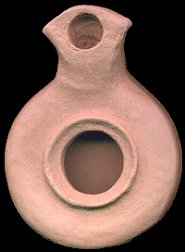 |
HERODIAN:
Circa 50 B.C. to A.D. 50 Known as the Herodian because of it's wisdespread use during the reign of Herod the Great in Israel (circa 37 BC to 4 BC), this lamp was wheelmade with the spout being applied by hand. Thus, every Herodian lamp is slightly different. The type remained in use up to about AD 150 in some parts of the Holy Land, but is normally considered to have gone out of general use by about AD70. Although mainly confined to the Jerusalem area, they have also been found at Herodian, Masada, and other Jewish settlements in the region. The replica Herodians offered here are made in Roman syle molds, but to remain faithful to the variety of originals, two different Herodian lamps were used to create the molds. This is the best choice for those wishing to have a lamp like those that would have been the most common in Judea during the ministry of Jesus.(about 3.25" x 2.5") |
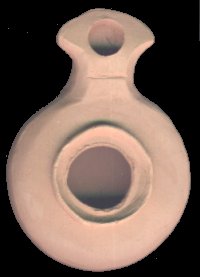 |
|
|
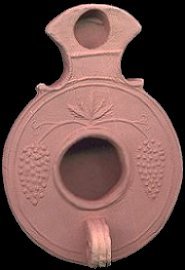 |
DAROM:
Circa A.D. 70 to A.D. 135 Following the Roman destruction of the Second Temple, a new lamp style was developed in the Hebron hill region by refugees from Jerusalem. Now mold-made, it was clearly descended from the Herodian. The style was popular from from about AD 70 to the end of the Bar-Kokhba Revolt in AD 135. The grape and lily motif is based on an original Darom lamp, named for a major production area of this style. The grapes may imitate a golden grape cluster at the Temple in Jerusalem. These lamps are mold made as were the originals, with a small rounded handle.
|
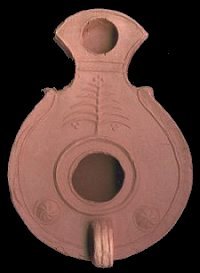 |
HEBRON:
Circa A.D. 70 to A.D. 135 A Darom style lamp, this model features a stylized palm tree with clusters of dates and vines, possibly a reference to the First Fruits festival in Israel. The symbol is also used in love poems (see Song of Solomon 7:8) and compared to the righteous (Psalms 92:12).
|
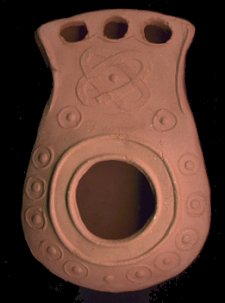 |
ASKELON:
Circa 2nd Century A.D. A three-wick lamp, styled after original examples from Israel. Multi-wicked
lamps produced more light, but also required more tending. These were probably
used in public places, where higher levels of light were necessary.
|
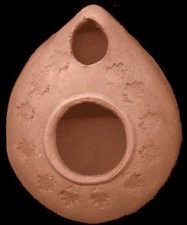 |
SAMARIA:
Circa A.D. 200- A./D. 300 Modeled after an original example found in Samaria, Central Palestine.
The Samaria features impressed leaves around a large central filling
hole, and has a slightly impressed circular ring on the base.
|
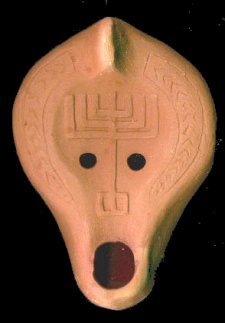 |
ATRIPALDA:
Circa A.D. 300- A.D. 400 The Atripalda lamp features a depiction of the Seven-Branched
Menorah, which was in the Temple of Jerusalem, and captured by the Romans
in the 1st Century AD. The reproduction is styled after an original variant
North African lamp dating to the 4th century AD, now in a museum in Jerusalem.
Another very similar lamp was excavated from Atripalda, in Italy. Depictions
of the Menorah are rare on early lamps, but more common in later
centuries.
|
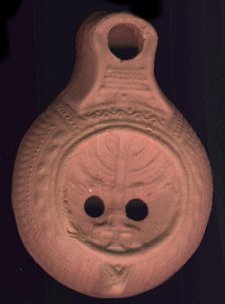 |
HAIFA:
Circa A.D. 300 to A.D. 400
Similar to the Atripalda, the Haifa also features a Menorah. This lamp, however, is of a style more closely associated with an origin in the Holy Lands, whereas the Atripalda is more of a Roman occupied North African area. Lamps similar to this model are known from Samaria as well. This particular lamp is made from a cast of an original in a museum in Jerusalem. Similar lamps are in the Hebrew University collection, as well one in the Hect Museum at the University of Haifa.
|
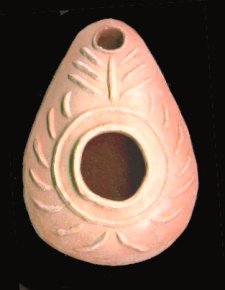 |
BETHANY:
Circa A.D. 400- A.D. 500 A Byzantine "candlestick" lamp. Most researchers call the design a stylized
menorah,
although some also argue it could also be a stylized palm branch, as many
were in use in Christian as well as Jewish homes of the 5th and 6th centuries
AD. This reproduction is based on several originals from Bethany, Nazareth,
and Jerusalem.
|
 |
JERUSALEM:
Circa A.D. 400- A.D. 500 Another of the Byzantine styles, this model features a cross near the
nozzle opening. This design was especially common in the Jerusalem area,
and the reproduction is based on originals from both there, and Caesarea.
Circa 5th-6th Centuries AD.
|
 |
GOLGOTHA:
Circa A.D. 300-A.D. 500 Similar to the Bethany, the Golgotha includes not only
the flame, branch or menorah symbol, but also two grape bunches on the
shoulder. The design is somewhat dulled as this was molded directly from
a lamp purported to be an original from the Holy Lands. Circa 4th-6th Centuries
AD.
|
| Place an Order |
|
|
|
||
|
|
|
||
|
|
|
||
|
|
|
||
|
|
|
|